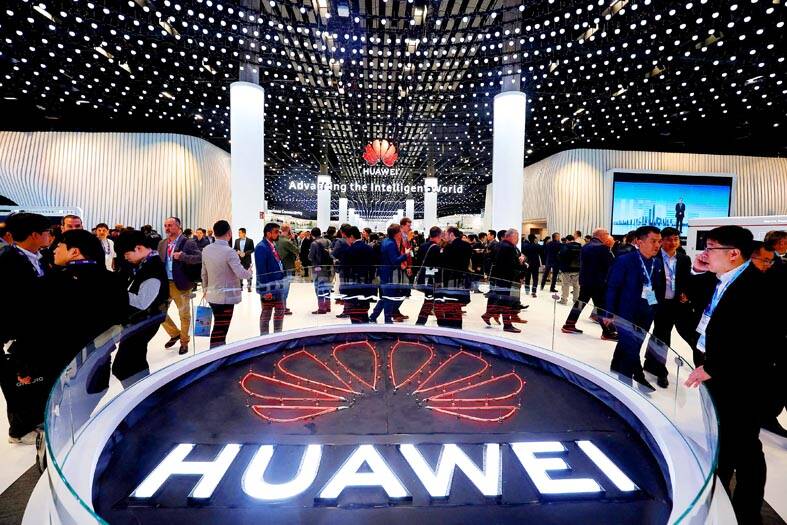US President Joe Biden’s administration is considering blacklisting a number of Chinese semiconductor firms linked to Huawei Technologies Co (華為) after the telecom giant notched a significant technological breakthrough last year, people familiar with the matter said.
Such a move would mark another escalation in a US campaign to ring-fence and curtail Beijing’s artificial intelligence (AI) and semiconductor ambitions. It would ratchet up the pressure on a Chinese national champion that has made advances despite existing sanctions, including producing a smartphone processor last year that many in Washington thought beyond its capabilities.
Most of the Chinese entities that could be affected were previously identified as chipmaking facilities acquired or being built by Huawei in a presentation by the Washington-based trade group Semiconductor Industry Association, people familiar with the matter said.

Photo: Reuters
No final decisions have been made, the people said.
The companies that could be blacklisted include chipmakers SiEn Integrated Circuits Co (芯恩), SwaySure Technology Co (昇維旭) and Pensun Technology Co (鵬新旭), the people said.
US officials are also weighing sanctions on China’s leading memorychip maker Changxin Xinqiao Memory Technologies Inc (CXMT, 長鑫存儲).
“Adding more Chinese companies to the US Entity List is a highly likely event,” Jefferies analyst Edison Lee (李裕生) wrote after CXMT was identified as a potential target. “It is easy to implement and justify, and it will further block certain key Chinese companies from being able to exploit current loopholes in export restrictions.”
Beyond companies that actually produce chips, US officials might also sanction Shenzhen Pengjin High-Tech Co (鵬進) and SiCarrier Technologies Co (新凱來), the people said.
The concern is that those two companies, which make semiconductor manufacturing gear, are acting as proxies to help Huawei obtain restricted equipment, the person said.
It is not clear whether the US Department of Commerce, which administers the so-called entity list, has additional evidence linking the companies to Huawei, the people said.
The US has the authority to sanction businesses that are at risk of harming its national security and officials do not necessarily need to prove past harmful or illegal activity.
The Chinese Ministry of Foreign Affairs reiterated that it “resolutely opposes” US actions that disrupt market order and harms Chinese enterprises, but did not comment specifically on the potential US moves under deliberation.
It is uncertain when US officials would make a final decision, the people said, adding that timing is likely to depend on the status of relations between Washington and Beijing — which both sides have worked to improve in recent months.
US Secretary of the Treasury Janet Yellen is expected to visit China again this year, and top officials have discussed a phone call between Biden and Chinese President Xi Jinping (習近平) this spring.
There are also other policy considerations, such as when the White House would announce a long-awaited adjustment of sweeping China tariffs first imposed under former US president Donald Trump.
Officials are also considering raising duties on older-generation chips from China, according to people familiar with the matter who said those conversations have picked up in the past few weeks.

The US dollar was trading at NT$29.7 at 10am today on the Taipei Foreign Exchange, as the New Taiwan dollar gained NT$1.364 from the previous close last week. The NT dollar continued to rise today, after surging 3.07 percent on Friday. After opening at NT$30.91, the NT dollar gained more than NT$1 in just 15 minutes, briefly passing the NT$30 mark. Before the US Department of the Treasury's semi-annual currency report came out, expectations that the NT dollar would keep rising were already building. The NT dollar on Friday closed at NT$31.064, up by NT$0.953 — a 3.07 percent single-day gain. Today,

‘SHORT TERM’: The local currency would likely remain strong in the near term, driven by anticipated US trade pressure, capital inflows and expectations of a US Fed rate cut The US dollar is expected to fall below NT$30 in the near term, as traders anticipate increased pressure from Washington for Taiwan to allow the New Taiwan dollar to appreciate, Cathay United Bank (國泰世華銀行) chief economist Lin Chi-chao (林啟超) said. Following a sharp drop in the greenback against the NT dollar on Friday, Lin told the Central News Agency that the local currency is likely to remain strong in the short term, driven in part by market psychology surrounding anticipated US policy pressure. On Friday, the US dollar fell NT$0.953, or 3.07 percent, closing at NT$31.064 — its lowest level since Jan.

The New Taiwan dollar and Taiwanese stocks surged on signs that trade tensions between the world’s top two economies might start easing and as US tech earnings boosted the outlook of the nation’s semiconductor exports. The NT dollar strengthened as much as 3.8 percent versus the US dollar to 30.815, the biggest intraday gain since January 2011, closing at NT$31.064. The benchmark TAIEX jumped 2.73 percent to outperform the region’s equity gauges. Outlook for global trade improved after China said it is assessing possible trade talks with the US, providing a boost for the nation’s currency and shares. As the NT dollar

The Financial Supervisory Commission (FSC) yesterday met with some of the nation’s largest insurance companies as a skyrocketing New Taiwan dollar piles pressure on their hundreds of billions of dollars in US bond investments. The commission has asked some life insurance firms, among the biggest Asian holders of US debt, to discuss how the rapidly strengthening NT dollar has impacted their operations, people familiar with the matter said. The meeting took place as the NT dollar jumped as much as 5 percent yesterday, its biggest intraday gain in more than three decades. The local currency surged as exporters rushed to